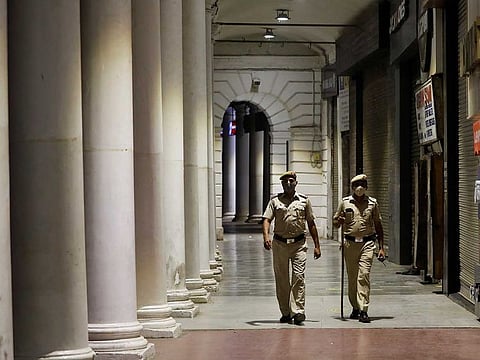Colonial cops: Why police in India needs more sensitivity
Visuals of a policeman, lifting, holding a newborn by its arm, has stunned social media

Derek Chauvin, former Minneapolis police official was recently sentenced to 22.5 years in prison for the murder of George Floyd.
Replace the US with the world’s largest democracy — India — and pick the country’s most populous state, Uttar Pradesh, and a member of the UP constabulary and have a UP Muslim stand in for Floyd.
The outcome will end badly for the Indian citizen who has attracted the notice of the man in khaki or olive green.
In India the newspaper-reading class applauded the sentencing of Chauvin and trended Black Lives Matter, while some Bollywood actors also clambered on the bandwagon. The same class remains mum on police high-handedness in India.
Recently in a viral picture, a cop held an infant by her arm, with rest of her tiny body dangling. Her mother stood protesting helplessly by the side.
Should a baby feel the long arm of the law? Should a baby have her shoulder dislocated?
How khaki plays out in India
After the picture went viral and attracted adverse comments, UP police claimed that the baby was fine and in fact the mother had thanked the UP police for their handling of the baby.
Don’t be incredulous. This is how it plays out for khaki in India. The police across India behave as colonial legatees and often push ordinary people around.
If the colonial mindset wasn’t bad enough, you have the culture of the “Dabang” (strongman) cop who shoots first and asks questions later and the toxic cult of the “Bahubali” (mafia politician) politician, specially in North India.
“Encounters” — a peculiar Indian definition and phenomenon — where the police shoot alleged law breakers in cold blood and then claim that the other side shot/attacked first is unique to India and has the tacit approval of the middle class.
The reason the trigger happy cops who revel in numbering their “encounters” are heroes because the middle class newspaper reader is impatient with the time it takes to legally convict criminals in the criminal justice system, where cases drag on for decades. The middle class is convinced that rough and ready justice sends a message.
This is proven to be wrong but, never get between the Indian middle class and a prejudice/belief they are passionately invested in. Rule of law is very good if applied to my neighbours. It surely should not be applied to me, seems to be the belief.
The extraordinary powers given to policemen by Yogi Adityanath, chief minister of Uttar Pradesh, is a case in point.
If a local journalist does her job and report on the trigger happy cops, she is charged with terror provisions.
Journalists at the receiving end
Several journalists who have faced these cases are languishing in jail and many have had cases filed against them for even reporting the victim’s version.
Yogi Adityanath has asked his force to act as the curiously named “Romeo” squad. What the Romeo squad does is target consenting couples, publicly shame them, demand fat bribes in some cases and report them to their families. If it’s an interfaith couple, it’s a lifelong tragedy for the couple.
The rule of law has come to this that when a notorious UP gangster Vikas Dubey fled after killing policemen and was caught and being taken back to Lucknow, an encounter was widely anticipated. Sure enough the UP police told the media cars not to follow and Dubey was killed for allegedly trying to escape police custody.
While the middle class may cheer such cases, most of the “encounter specialists” specially in the Mumbai police eventually become guns for hire till they are caught in some egregious excess like the recent case of Sachin Vaze — arrested for alleged extortion and murder.
I spoke to several retired and in service police officials. Both point the finger at the political bosses for systematic misuse of the police. They say that if you don’t have a political patron, you won’t go a long way in your career. This essentially means working as a leader’s hired gun with official protection.
Priorities of the police
The common people, the police is mandated to protect, hardly figure in the hierarchy of priorities. Across the spectrum in India, a khaki wearing cop is a visible sign of the sarkar (government) and often it’s only cops who are the first and last responders to any public problem — accidents, fires and other public crisis.
I have been a crime reporter and I can say first hand that the lot of the police constabulary is awful. They work long endless hours for very poor pay and are barely given any training. Fear is used to discipline them — of being suspended, dismissed or transferred.
This harried cop is then meant to regulate and deal with the public. Do you then blame him if he explodes and targets the public he is meant to protect?
Seventy years after India became a democracy, our leaders need to put the colonial past of the “Mai Baap Sarkar” (government as the all powerful father) to bed and allow the most visible symbol of our colonial legacy — a khaki man carrying out his master’s whip — to end.
The rule of law in a democracy means that citizens are treated with respect and all are equal. The only way this will become a reality is with massive, across the board, police reforms and training.
Police in India must understand that they serve the public.









